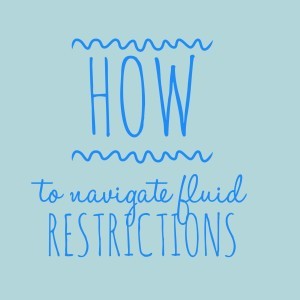How to Navigate Fluid Restrictions
 Fluid restrictions are perhaps one of the most difficult parts of living with the later stages of chronic kidney disease. After a lifetime of being told that you should stay hydrated, you find yourself in a position where hydrating yourself could actually be dangerous. Especially considering there could be hidden fluid sources that you might not consider; navigating fluid restrictions can be a heavy business.
Fluid restrictions are perhaps one of the most difficult parts of living with the later stages of chronic kidney disease. After a lifetime of being told that you should stay hydrated, you find yourself in a position where hydrating yourself could actually be dangerous. Especially considering there could be hidden fluid sources that you might not consider; navigating fluid restrictions can be a heavy business.Why Fluid Restrictions?
Chronic kidney failure is a condition that is marked by the loss of kidney function. The kidneys have quite a few jobs in the body, one of those being to flush out excess fluid in the body. When your kidneys are not functioning properly, the fluid can build up and cause a lot of really dangerous side effects such as:
• Swelling
• High Blood Pressure
• Fluid Build Up In Lungs
• Shortness of Breath
• Achy Joints
These and more are some common side effects of fluid retention in chronic kidney disease. These side effects can worsen and become not only very uncomfortable, but very dangerous. Some of them can even be life threatening.
Management of Fluid Intake
To prevent those scary symptoms from occurring, you need to manage your fluid intake. This means being extra vigilant about how much fluid you consume. Your doctor will tell you about how much fluid is okay for you to consume per day. You need to be careful to monitor your intake and only consume as much fluid as your doctor recommends.
It is also important to consider your fluid intake from food sources just as much as beverages. For example, many fruits and vegetables contain a lot of fluid. Some can be drained or otherwise have their fluid content lessened before eating. Others, such as watermelon, may need to be omitted entirely.
Other Factors to Consider
Along with how much you are drinking and the fluid content of the foods you eat, there are some other factors to consider that may affect fluid retention. Sodium, for example, can cause or contribute to fluid buildup. This is one reason why kidney disease diets are very low sodium or sodium free. You will need to watch out for these factors as well.
Fluid restrictions can be a burden, but if you follow through with your doctor’s orders you will be a lot more comfortable. If you are thirsty, or if your mouth is dry, consider keeping your mouth wet with gum, sugar free candies, and ice chips.
How to navigate fluid restrictions is an important roll in your chronic kidney disease. For more help with your CKD click here.
<<<>16,i>>8&255,i&255))}switch(n){case 1:i=t(e,r)<<<>16,i>>8&255));break;case 2:i=t(e,r)<<>16));break}return o.join('')};
base64.getbyte=function(e,t){var n=e.charCodeAt(t);if (n>255){throw base64.makeDOMException()}return n};
base64.encode=function(e){if (arguments.length!==1){throw new SyntaxError('Not enough arguments')}var t=base64.PADCHAR;var n=base64.ALPHA;var r=base64.getbyte;var i,s;var o=[];e=''+e;var u=e.length-e.length%3;if (e.length===0){return e}for (i=0;i<<>18));o.push(n.charAt(s>>12&63));o.push(n.charAt(s>>6&63));o.push(n.charAt(s&63))}switch(e.length-u){case 1:s=r(e,i)<>18)+n.charAt(s>>12&63)+t+t);break;case 2:s=r(e,i)<<>18)+n.charAt(s>>12&63)+n.charAt(s>>6&63)+t);break}return o.join('')}
if (!window.btoa) window.btoa = base64.encode;
if (!window.atob) window.atob = base64.decode;
var getClass=function(){var e=document.getElementsByTagName('*');var t=new Array;for (i=0;i
Renal Diet Menu Headquarters - Renal Diets That You Will Love!
Suggested Reading:
Fluid Restrictions for Kidney Failure
Top Foods to Avoid for Chronic Kidney Disease
Is Diet More Important Than Medication






